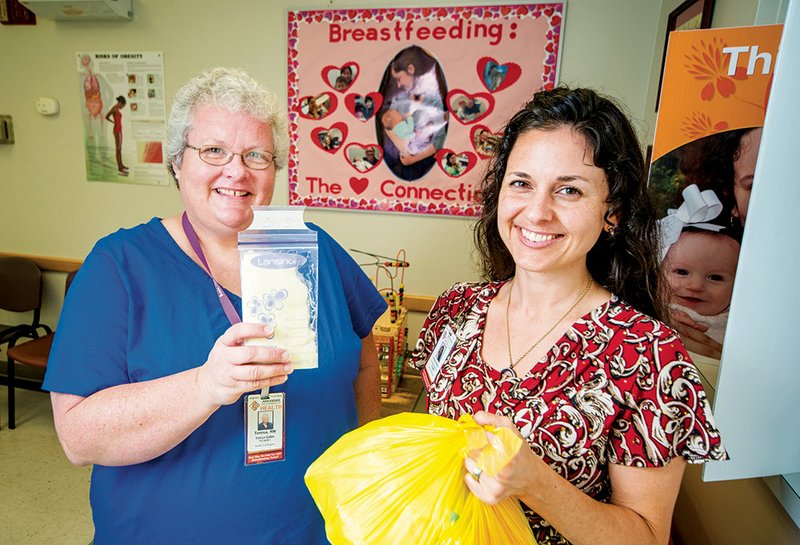Marinda Bryan of Marshall, a pharmacist at Clinton Drug, went back to work part time two weeks after her son was born, so she pumped and froze her breast milk.
“I’m very aware of the benefits of breastfeeding and how essential it is to give your kids a good start, especially in today’s age with all the bad eating and lack of exercise,” she said. Bryan, 26, said she and her husband, Herschell, wanted their son, Troy, to have the benefits breast milk gives the immune system.
“At 10 months, he just stopped drinking from a bottle; he’d push it away,” she said. “I had all this stockpile.”
Bryan made a few calls to find somewhere to donate her frozen milk, but she didn’t have any luck. Then she found out about the new milk depot at the Van Buren County Health Department, at 526 Quality Drive in Clinton.
A week ago, Bryan donated 232 ounces — 58 bottles — of breast milk.
It’s part of the Van Buren County Breastfeeding Resource Center at the Health Department, said Teresa Gates, registered nurse and internationally board-certified lactation consultant at the department.
Gates said the depot is a partnership with the Mothers’ Milk Bank of North Texas.
“I’ve contacted them frequently in the past because anytime I see a mother with an oversupply, I always encourage her to go ahead and donate her milk to a milk bank because there’s such a huge need,” Gates said.
Gates said one time when she called about getting brochures and information to give out to women, the person she was talking with asked, “How would you like to be a milk depot?”
The Texas organization provided a freezer to the Van Buren County Health Department and will pay all the costs, including electricity, Gates said.
“Basically, we signed an agreement that we will monitor the temperature on the freezer,” Gates said. “There’s absolutely no cost to the county.”
Mothers who wish to donate breast milk can contact the Mothers’ Milk Bank of North Texas, which will then arrange for them to have blood testing done locally at the Texas milk bank’s expense, Gates said. The milk bank will send containers, if the mother needs them, in which to freeze the milk.
“Sometimes that’s a barrier for a mom; they want to donate their milk, but they can’t afford to purchase the containers,” Gates said.
The women can then bring the frozen milk to the Health Department in Clinton.
Instead of helping one woman at a time, the milk bank is consolidating the shipping and saving money, she said.
The milk is tested, pasteurized and mixed for an exact caloric and nutritional content, Gates said. It is then sent to hospitals, including Arkansas Children’s Hospital and the University of Arkansas for Medical Sciences Medical Center, primarily for premature babies, Gates said.
“It’s primarily going to those really tiny babies in the neonatal intensive care,” Gates said.
“I think it’s a real powerful message to tell a mom that if you can’t provide us with milk, we’re going to use donor milk.
“If you’ve got a 28-week-gestation baby in [a hospital in] Little Rock and you live in rural Arkansas, you’ve got a stressful situation, and it takes moms a while, sometimes, to express milk for their babies.
“It’s so good for those babies to have mother’s milk.”
Premature babies are prone to a condition called necrotizing entercolitis, she said. Giving human milk helps coat the gastrointestinal tract, Gates said, which means the babies can recover faster and get out of the hospital faster.
“We’re helping the baby, we’re helping the family, but we’re also helping with medical costs,” she said.
Milk-depot donor Alex Churches, 20, of Clinton knows that better than most. Her 5-month-old daughter, Evelyn, was born five weeks premature when Churches’ placenta ruptured, and they both came close to dying, she said.
“Luckily, my dad is a police officer, and we jumped in the police car and went to Conway,” she said. Her daughter was hospitalized for a week.
Churches said she decided to breastfeed because of its health benefits.
“I’ve done research on it, and I know it’s the best thing for her, and it’s a lot cheaper than formula, too. It shows that breast-fed babies do so much better — especially premature babies — and that’s why I wanted to donate.”
She donated 550 ounces of breast milk on June 17, which “is going to help a lot of babies,” she said. Churches said she believes it made a difference in her daughter.
“Without the breast milk, I don’t think she’d be 14 pounds today. She was only 5 pounds when she was born,” Churches said.
Churches said her goal is to donate every month to the milk depot.
Gates said mothers who want to donate their milk may call her at the Health Department at (501) 745-2485, and she can provide contact information for the Mothers’ Milk Bank of North Texas.
Bryan said her son is a healthy 15-month-old. She did the math — and the milk she donated can potentially help 200 babies, she said.
“It makes me feel like I’m making a difference,” she said.
Senior writer Tammy Keith can be reached at (501) 327-0370 or tkeith@arkansasonline.com.
